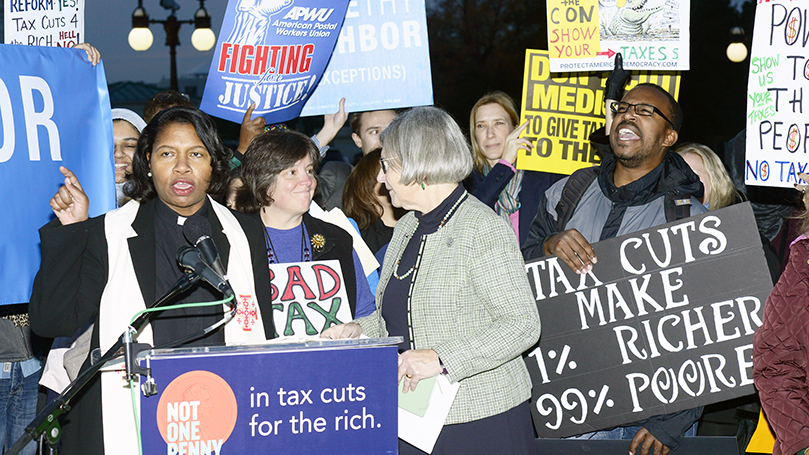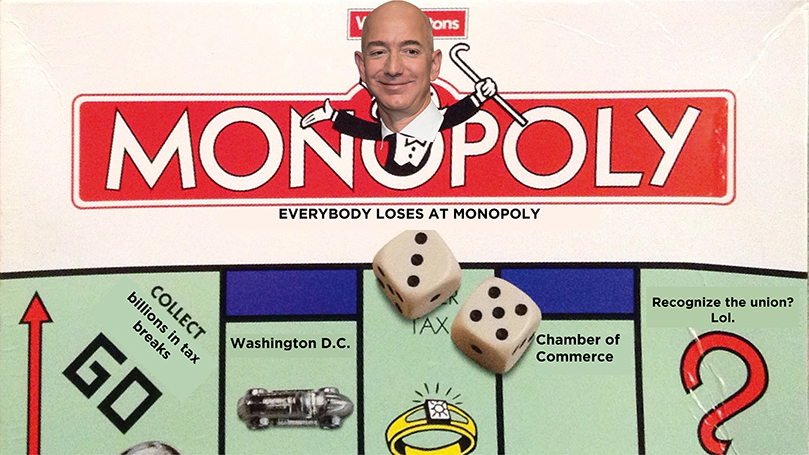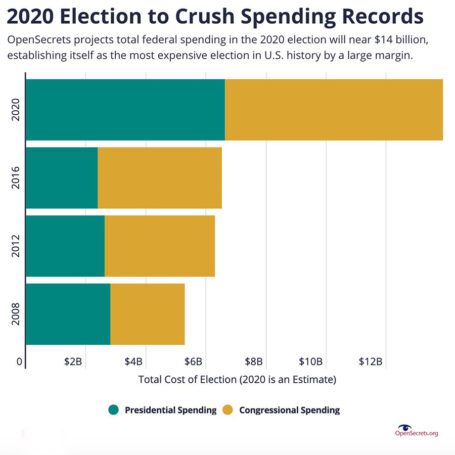
What is monopoly? When asked, most people in the United States think of the popular board game, Monopoly! with its bald, mustachioed capitalist mascot. Playing the game with family is a common rite of passage for children, though the game generally ends with everyone upset at the winner, who has been able to accumulate all of the property, money, and power on the board, while the other players go bankrupt.
The New Oxford English Dictionary defines monopoly as “the exclusive possession or control of the supply of or trade in a commodity or service.” Monopoly develops as a natural outcome of the competitive forces of capitalism, which Marx describes as a force that brings with it technological change and increases of efficiency in the production process, but ultimately leads to crisis and ruin.
Under capitalism, companies are driven by profit, and in order to realize higher rates of profit, are forced to design new products, exploit new consumer markets, and revolutionize the production process. On paper, capitalists are supposed to reinvest their profits into research and development and expansion. Companies that do not do this will be out-competed by other companies that do. They will lose out on expanding their profit margins and be driven to bankruptcy. Companies are forced to compete with one another to stay in business; eventually, there is one (or a few) left standing.
This tendency towards monopoly capitalism is dangerous for workers, and for the economy more generally. As companies grow in size and push out their competition, their opportunities for seeking higher rates of profit begin to dry up. With few other companies able to launch a serious challenge against their market superiority, and with fewer consumer choices for workers, these towering concerns begin to pinch every penny possible in an effort to chase decreasing rates (though not necessarily total amounts) of profit.
With no other company able to undercut its prices, it really is “dealer’s choice” as to what price tag can be attached to commodities and services. Workers cannot take advantage of competition between firms to raise their wages, and so, under monopoly conditions, wages begin to plummet. The quality of commodities and services also begins to decline, as firms cease reinvestment into the production process in an effort to widen profit margins. Stock buybacks — when companies simply use profits to buy their own stock at higher prices, artificially raise the profit rates of companies, and fattening their shareholders. These have become an increasingly popular corporate tactic, especially since the beginning of the Covid-19 pandemic.
This all seems very abstract and theoretical until we can see how the tendency toward monopoly is impacting workers at this very moment. Concert and airline ticket prices go up, railroad tracks begin to crumble, heinous labor exploitation tactics — breaking strikes and increasing use of child labor, for instance — make a roaring comeback, and workers are left holding the bag.

Believe it or not, being held captive by rising prices, crumbling infrastructure, and increasingly unsafe working conditions are not the most dangerous aspects of monopoly capital. In a country like the United States, monopoly capital is a direct threat to all forms of democracy.
As part of the process of competition, these massive companies invest their money in other ways, besides simply reinvesting in the production process. In 2021, the Washington Post reported that lobbying lawmakers was a $3.7 billion dollar industry annually. The 2020 election, meanwhile, clocked in as the most expensive election ever, with $14 billion being donated to both candidates. Of that, $2.6 billion came from entities connected to so-called “super PACs” and “dark money” organizations, a figure nearly double that of the 2016 election.
So what is big business’s return on such an investment? The word monopoly can also be used to describe the state itself, which philosophers like Thomas Hobbes and Max Weber described as having a “monopoly on violence” via its police, military, courts, and system of incarceration. Industry can call the shots on bills and regulations, utilizing the monopoly power of the state to shore-up their own positions in the marketplace. This can be seen by the United States dumping billions of dollars worth of arms on top of an increasingly deadly and dangerous war, a handout to the arms industry cartel, and by recent antitrust efforts being torpedoed by outside spending. Take for example the attempts made by congress, led by Senator Amy Klobuchar, to curb the power of Big Tech. Google, Apple, Amazon, and Facebook spent nearly $95 million on efforts to stop her “American Innovation and Choice Online Act.”

The Communist Party USA affirms that the current stage of capitalism in the United States is that of state monopoly capitalism. This stage is dangerous for the working class, as the extreme right seeks “a government that has no role except to facilitate the ruthless power grabs and accumulation of wealth by the giant monopoly corporations: banks, giant retailers, brokerage houses, private equity companies, insurance companies, fossil fuel transnational corporations, agribusiness, pharmaceutical companies, and arms merchants.”
Indeed, while some sections of monopoly capital supported the attempted fascist coup of January 6th, all sections of monopoly capital hand out big checks to both parties. This is why U.S. Transportation Secretary Pete Buttigieg could only stand in East Palestine, Ohio, and beg for Norfolk Southern to stop fighting regulations, instead of holding them accountable for the mess that their monopoly grab for diminishing profits caused to the environment and to the residents now battling the fallout of tonnes of poison having contaminated the Ohio River Valley. Norfolk Southern is responsible for maintaining 28,400 miles of track and only has one other competitor — CSX — for all the Class I rail east of Illinois.
In the face of monopoly capital’s threat to democracy, our working class faces intense challenges in effectively confronting both the extreme right and capitalism itself. Indeed, if fascism is defined as the “open terrorist dictatorship by the most reactionary, militarist, racist section of monopoly capital,” then it is imperative that we launch an effective fightback against monopoly capital, its most anti-democratic section in the first place.
Take Tesla and SpaceX owner Elon Musk’s recent acquisition of Twitter as an example. Musk himself has benefited greatly from government handouts, most recently gorging himself on $7.5 billion worth of subsidies to expand Tesla’s charging network. Musk’s SpaceX concern, a step toward the privatization of NASA, also soaks up billions in government money. His response to this taxpayer generosity is to unleash transphobic and racist hatred on the internet via his overhauling of safety guidelines at Twitter. Yet, lawmakers may think twice about challenging him on both his bigotry and financial crimes, since his company basically dominates the national space program and is adjacent to all of the so-called defense concerns that go along with it.
Or perhaps Jeff Bezos could be another instructive case study. The Amazon founder is as anti-labor as it gets, having offered up the lives of at least 14 warehouse workers on the altar of capitalism during the pandemic for record profits. He invested some of his profits into buying the Washington Post, the local paper of record for Washington D.C. How do lawmakers feel about mounting a serious challenge against his power? Perhaps the answer is found in the fact that Amazon could soon provide the back-end cloud services capability to the Pentagon itself.
The Communist Party maintains that, following the political defeat of monopoly capital’s most reactionary sections (including many of those already cited), the development of an anti-monopoly coalition will be both necessary and possible and will “build on the many struggles and issues already begun and won in the fight against the extreme right.” The anti-monopoly coalition will “embrace all the social movements and political tendencies who oppose these transnationals,” many of which are now developing their unity in the struggle against the extreme-right’s anti-democratic assaults.
A core force in these battles is organized labor, a key part of which has most recently called for nationalizing the railroad industry, for example. Its allies include elected legislators who are fighting against the increasing concentration of corporate control over our elections, public infrastructure, and media. Even the mom-and-pop store on the corner might be willing to let us hang a sign in the window for our next town hall about a new Whole Foods (owned by monopoly power Amazon) or luxury condo high-rise (owned by monopoly power BlackRock) in the neighborhood.
By working to build an anti-monopoly coalition, the party will continue to contribute to the development of a mass people’s party free of corporate domination, to work for the increased power of organized labor, and to build a movement that will bring the arms manufacturers in the police and Pentagon to heel.
Images: People’s Filibuster Protests Trump’s Tax Scam Bill 5 by Stephen Melkisethian (CC BY-ND-NC 2.0 JP); Monopoly by Mike Mozart (CC BY 2.0), cropped with cropped sample of Flag Day Naturalization Ceremony Honoring Jeff Bezos by National Museum of American History (CC BY-NC 2.0); 2020 Election to Crush Spending Records by OpenSecrets.org (Twitter)


 Join Now
Join Now